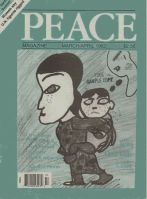
Peace Magazine Mar-Apr 1992, page 12. Some rights reserved.
Search for other articles by Leonard Desroches here
"I'm going to a conference on how to organize the security of whole countries without armies." If you 'd said this a few years ago, most Canadians would have shaken their heads in smug, polite ridicule. Today, Lithuania '5 parliament has endorsed civilian-based defence as an integral part of their security.
The Civilian-Based Defence Association, which has been monitoring the global development of nonviolent forms of defence, recently organized a conference in Windsor to increase understanding of civilian-based defence (CBD). Participants discussed thorny issues such as how to introduce CBD to military and other traditionally defence-oriented audiences, and how to develop economic self-sufficiency as a preparation for CBD. A powerful play, "The Eleventh Mayor," illustrated how the United States might be defended by civilian nonviolent action against invasion.
By the end of the weekend, we had moved towards a clearer understanding of the theory and practice of civilian-based defence. Civilian-based defence would defend a nation by nonviolent struggle against an invasion or coup d'etat, through sanctions and noncooperation with an invader or usurper. Civilian-based defence has the potential to replace war.
The conference led me to several practical conclusions. I want to propose that Canadians reserve energy and money to help establish one actual precedent. I suggest a reciprocal international conference focusing on Lithuania. Secondly, on the local level I propose reserving energy and money to help the Assembly of First Nations explore deeply the dimensions of truly nonviolent resistance and nonviolent alternative ways of living. Ovide Mercredi, the Assembly's newly elected president has been clear in advocating nonviolence.
On a more theoretical level, the conference led me to question the purely technical approach which some take to nonviolent defence.
Historically, we are learning that a purely rational approach to reality (including conflict) is unrealistic and therefore impractical. Scientists are discovering that to push our rational powers to the limit without acknowledging the mystery of life has had disastrous consequences. When native people, and a growing number of scientists, speak of "Mother Earth" they are pointing to a relationship that includes but goes beyond the purely rational. We should respect and learn from one another's spirituality as the places where our strategies and tactics come from.
When I was invited, along with a few others, to join some of the Mohawk Indians at Kanesatake and Kahnawake to explore nonviolent training, I heard two words over and over: "respect" and "trust." Respect and trust are spiritual realities of great relevance to CBD.
In the language of civilian-based defence we need to have the strongest possible intellectual discipline in researching, naming and organizing the techniques. It is not good enough to grudgingly acknowledge that in our collective efforts toward the development of CBD we all come from different spiritual (some would say "philosophical") perspectives. We have to engage one another, respectfully, in a full exploration of such realities.
To remain at the purely rational and technical level is to suggest that civilian-based defence can be limited to a lack of weapons. There are women, children and men who have never been hit by a physical weapon but who have, through profound disrespect, been seriously abused.
There are people in the peace movement whom I have met who, without any physical weapons, could be very manipulative and in the end dictatorial if they rose to a position of power. There are others in the peace movement who are sincerely opposed to nuclear weapons but who are filled with unresolved bitterness and desire for revenge-without physical weapons. If this was civilian-based defence, I for one would call it oppressive.
Imagine 10,000, or even just 10 people throughly trained in the techniques of nonviolence but with no respect among them. Would anyone seriously suggest that their civilian-based defence would work?
The absence of weapons is merely the beginning of our development of spiritual capacity for such realities as trust and respect.
People power was lived by the suffragists, the civil rights movement and much of the labor movement. People power is a way of living (e.g. sharing resources), a way of resisting (e.g. employing sanctions) and a way of dying (e.g. refusing hatred). In the Nazi era, 5,000 French villagers of Le Chambon successfully hid 5,000 Jews. Their power was at both the strategic level and the spiritual level. Besides employing brilliant tactics, they refused to hate. Historical study shows that this spiritual power almost certainly made the difference.
Civilian-based defence is an element of "people power."
We need to develop both the practice and the spirituality of "people power": learn to put in motion the best sanctions and the most respect and trust. To study and develop a world without armies is to study and develop both dimensions.
Len Desroches does nonviolence training for many groups.

Peace Magazine Mar-Apr 1992, page 12. Some rights reserved.
Search for other articles by Leonard Desroches here